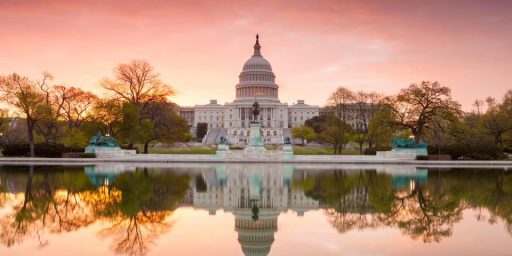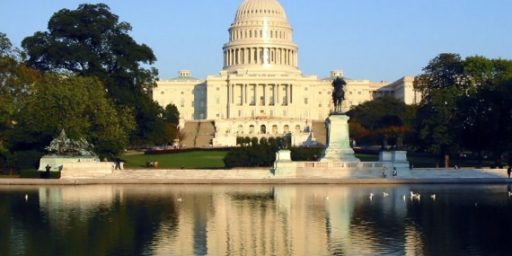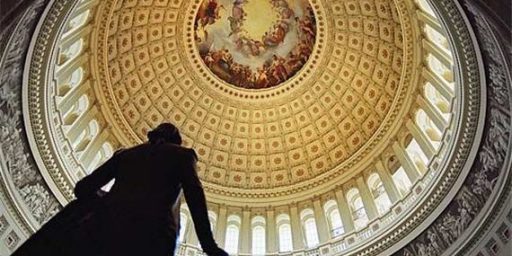Earmark Reform Isn’t Just Symbolism
Eliminating earmarks is good policy and good politics.
 Senator Tom Coburn addresses some of the widespread myths and overlooked realities of the debate over earmarks:
Senator Tom Coburn addresses some of the widespread myths and overlooked realities of the debate over earmarks:
Myths of the earmark debate:
1. Eliminating earmarks does not actually save any money
This argument has serious logical inconsistencies. The fact is earmarks do spend real money. If they didn’t spend money, why defend them? Stopping an activity that spends money does result in less spending. It’s that simple. For instance, Congress spent $16.1 billion on pork in Fiscal Year 2010. If Congress does not do earmarks in 2011, we could save $16.1 billion. In no way is Congress locked into to shifting that $16.1 billion to other programs unless it wants to.
2. Earmarks represent a very tiny portion of the federal budget and eliminating them would do little to reduce the deficit
It’s true that earmarks themselves represent a tiny portion of the budget, but a small rudder can help steer a big ship, which is why I’ve long described earmarks as the gateway drug to spending addiction in Washington. …
Earmarks were rare until recently. In 1987, President Reagan vetoed a spending bill because it contained 121 earmarks. Eliminating earmarks will not balance the budget overnight, but it is an important step toward getting spending under control.
3. Earmarking is about whose discretion it is to make spending decisions. Do elected members of Congress decide how taxes are spent, or do unelected bureaucrats and Obama administration officials?
It’s true that this is a debate about discretion, but some in Congress are confused about discretion among whom. This is not a struggle between the executive branch and Congress but between the American people and Washington. Do the American people have the right to spend their own money and keep local decisions at the local level or does the federal government know best? Earmarks are a Washington-knows-best solution. An earmark ban would tell the American people that Congress gets it. After all, it’s their money, not ours.
An earmark moratorium would not result in Congress giving up one iota of its spending power. In any event, Republicans should be fighting over how to cut government spending, not how to divide it up.
4. The Constitution gives Congress the responsibility and authority to earmark
Nowhere does the Constitution give Congress the authority to do earmarks. The concept of earmarking appears nowhere in the enumerated powers or anywhere else in the Constitution. The so-called “constitutional” argument earmarks is from the same school of constitutional interpretation that led Elena Kagan to admit that Congress had the authority to tell the American people to eat their fruits and vegetables every day. That school, which says Congress can do whatever it wants, gave us an expansive Commerce Clause, Obamacare, and a widespread belief among members of Congress that the “power of the purse” is the power to pork.
Earmark defenders are fond of quoting Article I, Section 9 of the Constitution which says, “No money shall be drawn from the Treasury, but in consequence of appropriations made by law.” They also refer to James Madison’s power of the purse commentary in Federalist 58. Madison said the “power of the purse may, in fact, be the most complete and effectual weapon with which any constitution can arm the immediate representatives of the people.”
Yet, earmark proponents ignore the rest of the Constitution and our founders’ clear intent to limit the power of Congress. If the founders wanted Congress to earmark funds to specific recipients, micromanage American society, and ride roughshod over state and local government they would have given Congress that authority in the enumerated powers. They clearly did not.
Our founders anticipated earmark-style power grabs from Congress and spoke against such excess for the ages. James Madison, the father of the Constitution said, “With respect to the two words ‘general welfare,’ I have always regarded them as qualified by the detail of powers connected with them. To take them in a literal and unlimited sense would be a metamorphosis of the Constitution into a character which there is a host of proofs was not contemplated by its creators.”
I made some similar arguments in my colleague Doug’s thread on the “phony” symbolism of this issue, particularly with regard to the importance of keeping spending authority where the Constitution places it: Congress. But Sen. Coburn makes clear that I wasn’t nearly vocal enough about the positive fiscal effects of banning this practice. Not to mention the Constitutional and economic significance. We wouldn’t — and shouldn’t — wave off a few hundred million in spending for an unconstitutional program that harmed free speech as unimportant merely because it didn’t cost much in the grand scheme of things. The same logic applies to earmarking.
The long and the short of it: Naysayers notwithstanding, there’s nothing phony about this debate. And even if there weren’t non-trivial savings to be had, eliminating the practice would still be good policy and good politics.
RTWT.






I am somewhat surprised none of the libbies who regularly post comments here have nothing to say on the subject.
Nothing is stopping the incoming Tea Party winners (were there any?) from refusing to make any earmarks for their constituents.
Coburn is simply wrong about Point #1.
Earmarking involves designating where funds that have already been allocated — to, say, the Department of Transportation — are spent. If you want to cut spending, you have to start with the appropriations bills, none of which have ever been cut – not even by the anti-earmark “cut spending” crowd among the GOP.
I am waiting for them to actually start cutting spending.
Zels
“I am somewhat surprised none of the libbies who regularly post comments here have nothing to say on the subject.”
That’s because you haven’t taken the time to find out, effing moron.
“I am waiting for them to actually start cutting spending.”
Oh, good luck with that…
I hear claims on one side that earmarks merely pull from the pool of already-allocated funds, and on the other side that they’re new money, but nobody ever backs up their claims with facts.
So who among you are going to actually back up what you’re saying with the truth instead of spouting your opinions and calling them facts?
Boyd,
Even the advocates of earmark reform have admitted that banning earmarks will not, by itself, cut spending at all. Coburn is the first one I’ve seen make that claim.
The argument that the reform advocates make is that barring earmarks would remove a tool that is used to “bribe” Congressmen to vote for higher spending. That’s a guess about what might happen, though, and not a provable fact.
Okay, Doug, but “everybody but Dodd and Senator Coburn agrees” still isn’t proof. How is this knowable beyond merely appealing to the authority of consensus?
And trust me, there have been too many times when other folks on the same side of an issue as I am have proved themselves to be idiots, including the “leaders,” so just because some advocates have ceded the point still doesn’t convince me.
How do we know the truth of the matter?
The problem, of course, is this clause in the Constitution:
Article 1, section 8, clause 18
Needless to say, the clause was a point of contention between the Federalists and the Anti-Federalists, and the argument continues to this day (e.g., in the health care reform debate).
So try that in a multi-year cycle. The DOT needs to repair some roads, gets its allocation, but is told to spend the money on new bridges (to nowhere or not). So the next year they ask for allocation to fix those roads (again) and now to finish the bridges, and are told to spend the money on a new bypass. So the next year they ask for money to fix the roads, finish the bridge and the bypass …
The problem is that it piles deeper and deeper.
BTW, speaking of Federalist and Anti-Federalists, and earmarks, couldn’t one say that the greatest earmark is the history of the United States was the federal funds allocated for the Louisiana Purchase? Attn: Thomas Jefferson.
And I do understand that strictly speaking, it wasn’t an earmark. I just mentioned it to illustrate that the allocation of federal funds for purposes not clearly stated in the Constitution is something that’s been with us for a long, long time.
Boyd,
It seems pretty straightforward to me. Appropriations bills spend money. Earmarks direct appropriated funds to specific projects. Without earmarks, the already-appropriated funds would be spent through Executive Branch procedures. I don’t know what “evidence” would convince you, but I can recommend a quality American Government textbook or something more geared at specialists if you like.
So what earmarking mostly does is empower Congress, not the Executive Branch, to spend some of the money Congress appropriates. Since Congress is made up of directly-elected individuals, I would think this kind of legislative control would be preferable to folks like Dodd and the author of the NR article he quotes, as full of assumptions as that piece is.
I am stuck at work and have no access to my journals, but I believe it was the National Interest that wrote on this within the last year. Before earmarks, the money was divided up at the state level by faceless bureaucrats. Now, the same amount of money is appropriated, but some of it is designated by a Congressperson or Senator for specific spending. In general, most of what I have read suggests that earmarks are carved out of existing spending bills. I suppose it is possible that a congress critter would ask for a larger spending bill with the idea of financing an earmark, but my understanding is pretty consistent with what Doug has said.
Steve
“Eliminating earmarks will not balance the budget overnight, but it is an important step toward getting spending under control.”
It occurs to me that this is the substantive passage from Mr. Coburn’s position, and while I cannot fault him for dishonesty or being factually in error, I can fault him for being naive. Earmark reform is a fig leaf, and an admittedly small one at that, to make up for the abject cowardice permeating the political class. It has inverted the priority list; much as though he would in his capacity as a physician prescribe aspirin for the headaches caused by a brain tumor and then congratulate himself on acting boldly against cancer.
It is rhetorical camouflage for people who will not challenge entitlements, who will not slash defense spending, who will not reform the tax code and who have very little, if anything, to contribute to the neccessary attenuation of the federal government.
“…people who will not challenge entitlements, who will not slash defense spending, who will not reform the tax code and who have very little, if anything, to contribute to the neccessary attenuation of the federal government.”
But we just had an earthquake! A new Republican Revolution to change Washington for the better! Surely the GOP will do what must be done to balance the budget, get the government’s fiscal house in order, and provide a magical pony for everyone…